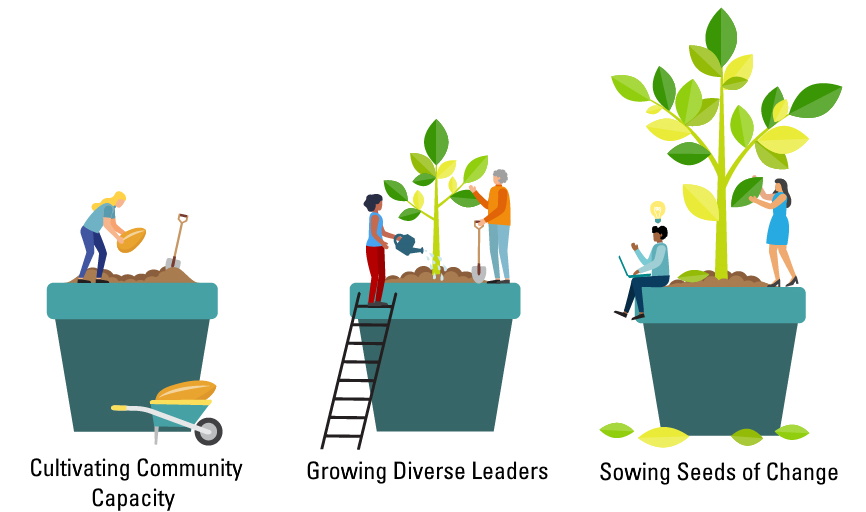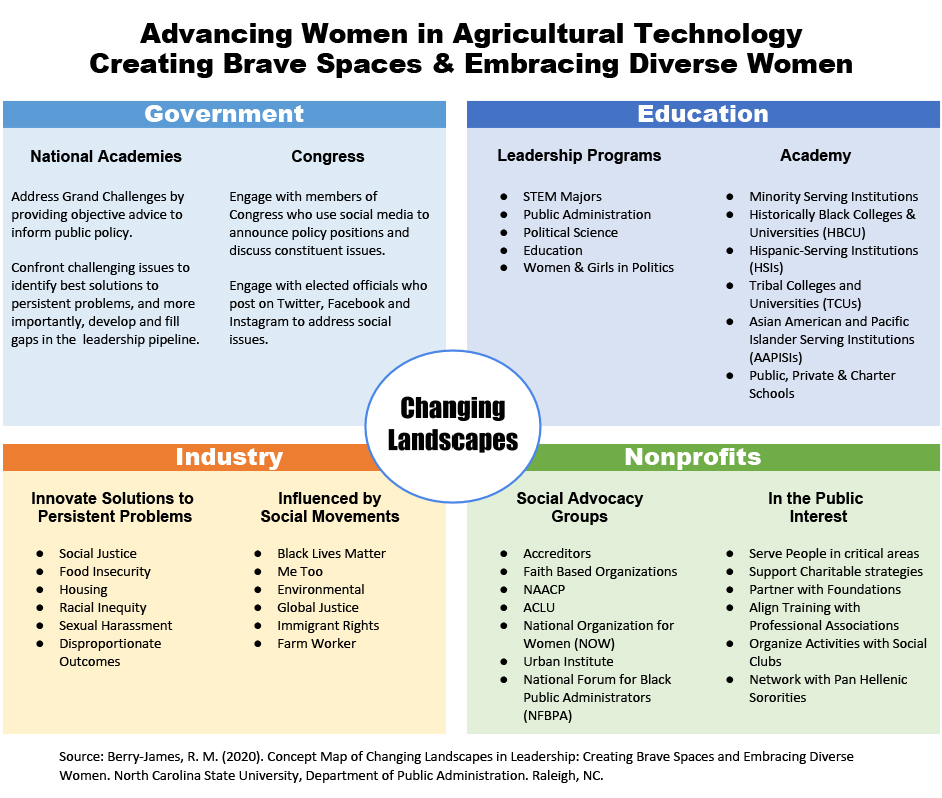About
Changing Landscapes: Brave Spaces for Advancing Women in Agricultural Technology (Changing Landscapes) is a program developed in response to the Equality Can’t Wait Challenge.
Women and Women of Color (WWC) are grossly underrepresented in agricultural sciences and technology (AgTech). Women earn only 30% of PhDs and advance at lower proportions than men at each subsequent career-level. This male-domination limits the scope and quality of solutions required for a more sustainable, equitable, and healthy food-supply under increasing populations, climate change, and other environmental pressures.
Our “Changing Landscapes” (CL) project propels WWC to leadership positions in AgTech through a comprehensive program centered on practices of inclusive change: equipping individuals, creating equal opportunity, and transforming cultures. From on-the-farm to academe, and throughout industry, government, non-profits, and society, CL opens doors-of-opportunity at critical junctures for WWC; provides technical and insider expertise through mentor-networks, and dismantles institutional inequities through policy analysis and advocacy. CL creates a vanguard of change agents across North Carolina (NC) and beyond to increase and empower WWC in shaping agricultural systems.
Our Solution
To transform the AgTech landscape, the CL-project takes a comprehensive approach through three streams founded on inclusive practices for advancing WWC in STEM.
- Cultivating Community Capacity serves 4H-youth, community-college, and university WWC-students working with WWC-farmers and faculty to bolster their AgTech experiences and capacities. This stream will increase the number of WWC interested in and entering AgTech careers in NC and beyond.
- Growing Diverse Leaders implements personalized and career-long mentorship of WWC within a cross-sectoral network. Our approach is novel because existing programs seldom meet advancement-needs across the career-span or appeal to women interested in diverse sectors. Sample strategies include career-fairs, grant-writing seminars, entrepreneurship-training, leadership in public-service workshops (with NAPA), peer-review of scholarship, shadowing researchers, and supportive-spaces to elevate WWC. This stream also serves to prevent career-pipeline-leaks and provide opportunities for re-entry after child-or-elder-care through financial stipends and other resources.
- Sowing Seeds of Change destabilizes the status-quo through training in inclusive, anti-racist practices targeted at high-level AgTech decision-makers in our networks. Further, we will analyze policies and advocate for changes to dismantle structural inequities; promote the voices and work of WWC through diverse media, and compile a transparent salary-equity database for AgTech organizations. External evaluators will measure CL’s impact through indicators of women’s power and influence, e.g. content creation, wages, leadership roles, as well as:
- The number of WWC entering and advancing in AgTech careers as a result of CL-programming,
- WWC’s assessments of their career-well-being, institutional experiences, and leadership-potentials after CL-programs, and
- Attitudinal shifts in high-level decision-makers in AgTech.
Changing Landscapes elevates women in agricultural technology through cross-sector and on-farm collaborations, personalized-mentoring, supportive spaces, leadership- and entrepreneurship-training, amplifying women’s voices, and dismantling structural inequities.
Project Team
Partners
The Genetic Engineering and Society (GES) Center at North Carolina State University serves as the principal organization for the ECW Changing Landscapes proposal. We have formal partnerships with five organizations, plus collaborations with many more.
Theory of Change
Over the 5-year grant, the number of WWC in AgTech fields and leadership positions will grow as a result of Changing Landscapes. In the longer-term, Changing Landscapes will help dismantle macro-level barriers for WWC. Promising practices from the literature to achieve greater equity in STEM guide our work. For example, WWC share disproportionate burdens of unpaid-service in professions, homes, and communities; therefore, Changing Landscapes offers financial-stipends and childcare-resources for participants. WWC also often lack the social networks for mentorship and advancement; therefore, the program provides a unique, personalized, career-long mentoring-network where we will meet WWC’s needs as they identify them. Further, social-roles and expectations-states theories show how for centuries, WWC are discouraged to rise within organizations due to harmful stereotypes. Therefore, we will foster identity and belonging for WWC as AgTech change-agents throughout associated programs and engage white-male and other AgTech leaders to join in action for demolishing structural inequities.
While there are several national organizations working on diversity in STEM, to our knowledge, we are the first to focus on the intersection of agriculture and emerging technologies. These areas are so vital to healthy, sustainable food systems, yet they are plagued with too few WWC leaders. In addition, while the literature suggests practices for increasing diversity in STEM fields, they tend to target a particular sector or career-stage. We innovate by integrating promising-practices into a comprehensive program so that our impact is greater than the sum-of-its-parts. We differentiate our work by its cross-sectoral approach (e.g. academe, government, industry, NGOs) and its extension from beginning-to-middle-to-end of careers and through society. Feedback, synergies, and bi-directional learning among diverse participants will amplify the program’s impact in real-time. We also design and implement new programmatic elements (e.g. Diverse-Farm-Tours, personalized-mentoring service) based upon our own experiences of rising to leadership in AgTech.


